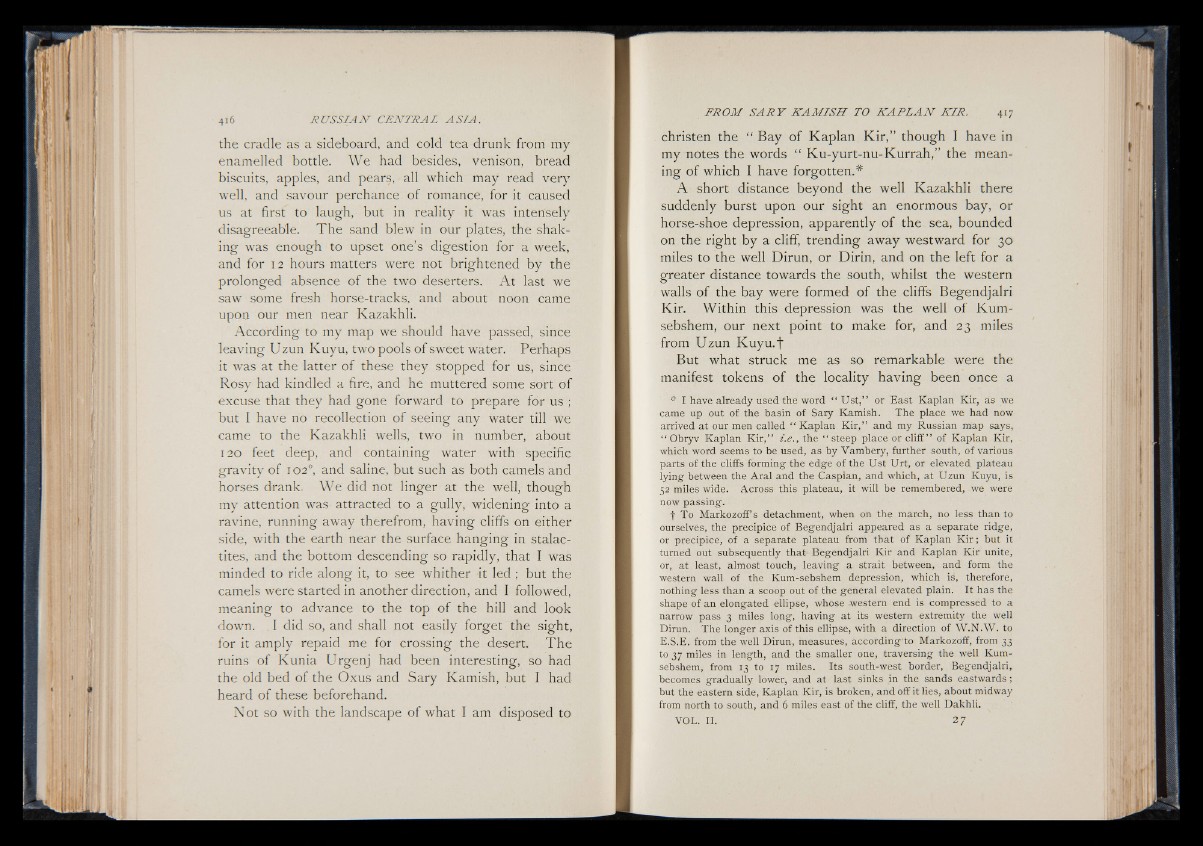
the cradle as a sideboard, and cold tea drunk from my
enamelled bottle. We had besides, venison, bread
biscuits, apples, and pears, all which may read very
well, and savour perchance of romance, for it caused
us at first to laugh, but in reality it was intensely
disagreeable. The sand blew in our plates, the shaking
was enough to upset one’s digestion for a week,
and for 12 hours matters were not brightened by the
prolonged absence of the two deserters. A t last we
saw some fresh horse-tracks, and about noon came
upon our men near Kazakhli.
According to my map we should have passed, since
leaving Uzun Kuyu, two pools of sweet water. Perhaps
it was at the latter of these they stopped for us, since
Rosy had kindled a fire, and he muttered some sort of
excuse that they had gone forward to prepare for us ;
but I have no recollection of seeing any water till we
came to the Kazakhli wells, two in number, about
120 feet deep, and containing water with specific
gravity of 102°, and saline, but such as both camels and
horses drank. We did not linger at the well, though
my attention was attracted to a gully, widening into a
ravine, running away therefrom, having cliffs on either
side, with the earth near the surface hanging in stalactites,
and the bottom descending so rapidly, that I was
minded to ride along it, to see whither it led ; but the
camels were started in another direction, and I followed,
meaning to advance to the top o f the hill and look
down. I did so, and shall not easily forget the sight,
for it amply repaid me for crossing the desert. The
ruins of Kunia Urgenj had been interesting, so had
the old bed of the Oxus and Sary Kamish, but I had
heard of these beforehand.
Not so with the landscape of what I am disposed to
christen the “ Bay of Kaplan K ir ,” though I have in
my notes the words “ Ku-yurt-nu-Kurrah,” the meaning
of which I have forgotten.*
A short distance beyond the well Kazakhli there
suddenly burst upon our sight an enormous bay, or
horse-shoe depression, apparently of the sea, bounded
on the right by a cliff, trending away westward for 30
miles to the well Dirun, or Dirin, and on the left for a
greater distance towards the south, whilst the western
walls of the bay were formed of the cliffs Begendjalri
Kir. Within this depression was the well of Kum-
sebshem, our next point to make for, and 23 miles
from Uzun K u yu .t
But what struck me as so remarkable were the
manifest tokens of the locality having been once a
9 I have already used the word “ Ust,” or East Kaplan Kir, as we
came up out of the basin of Sary Kamish. The place we had now
arrived at our men called “ Kaplan Kir,” and my Russian map says,
“ Obryv Kaplan Kir,” i.e., the “ steep place or cliff” of Kaplan Kir,
which word seems to be used, as by Vambery, further south, of various
parts of the cliffs forming the edge of the Ust Urt, or elevated plateau
lying between the Aral and the Caspian, and which, at Uzun Kuyu, is
52 miles wide. Across this plateau, it will be remembered, we were
now passing.
f To Markozoff’ s detachment, when on the march, no less than to
ourselves, the precipice of Begendjalri appeared as a separate ridge,
or precipice, of a separate plateau from that of Kaplan Kir; but it
turned out subsequently that Begendjalri Kir and Kaplan Kir unite,
or, at least, almost touch, leaving a strait between, and form the
western wall of the Kum-sebshem depression, which is, therefore,
nothing less than a scoop out of the general elevated plain. It has the
shape of an elongated ellipse, whose -western end is compressed to a
narrow pass 3 miles long, having at its western extremity the well
Dirun. The longer axis of this ellipse, with a direction of W.N.W. to
E.S.E. from the well Dirun, measures, according'to Markozoff, from 33
to 37 miles in length, and the smaller one, traversing the well Kum-
sebshem, from 13 to 17 miles. Its south-west border, Begendjalri,
becomes gradually lower, and at last sinks in the sands eastwards;
but the eastern side, Kaplan Kir, is broken, and off it lies, about midway
from north to south, and 6 miles east of the cliff, the well Dakhli.